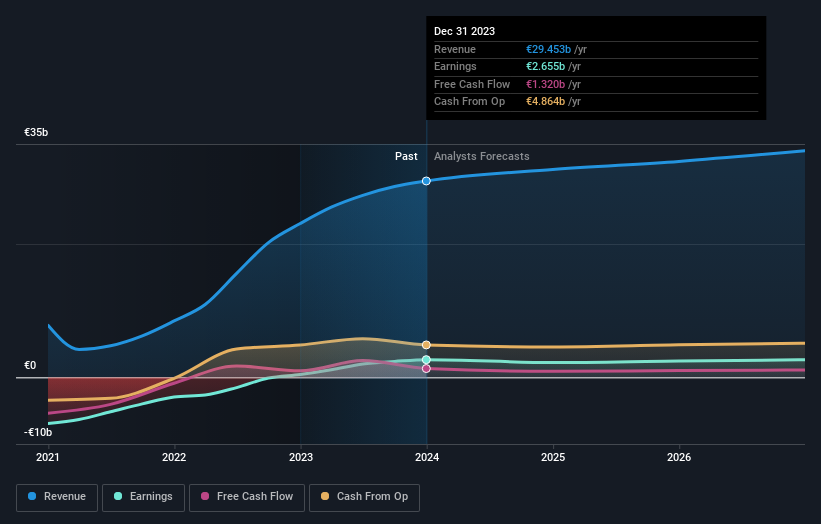Stock Analysis
- United Kingdom
- /
- Airlines
- /
- LSE:IAG
International Consolidated Airlines Group (LON:IAG) investors are sitting on a loss of 39% if they invested five years ago

While it may not be enough for some shareholders, we think it is good to see the International Consolidated Airlines Group S.A. (LON:IAG) share price up 21% in a single quarter. But over the last half decade, the stock has not performed well. You would have done a lot better buying an index fund, since the stock has dropped 64% in that half decade.
Since shareholders are down over the longer term, lets look at the underlying fundamentals over the that time and see if they've been consistent with returns.
See our latest analysis for International Consolidated Airlines Group
While markets are a powerful pricing mechanism, share prices reflect investor sentiment, not just underlying business performance. One way to examine how market sentiment has changed over time is to look at the interaction between a company's share price and its earnings per share (EPS).
International Consolidated Airlines Group became profitable within the last five years. Most would consider that to be a good thing, so it's counter-intuitive to see the share price declining. Other metrics may better explain the share price move.
In contrast to the share price, revenue has actually increased by 1.5% a year in the five year period. So it seems one might have to take closer look at the fundamentals to understand why the share price languishes. After all, there may be an opportunity.
The image below shows how earnings and revenue have tracked over time (if you click on the image you can see greater detail).

International Consolidated Airlines Group is a well known stock, with plenty of analyst coverage, suggesting some visibility into future growth. If you are thinking of buying or selling International Consolidated Airlines Group stock, you should check out this free report showing analyst consensus estimates for future profits.
What About The Total Shareholder Return (TSR)?
Investors should note that there's a difference between International Consolidated Airlines Group's total shareholder return (TSR) and its share price change, which we've covered above. The TSR attempts to capture the value of dividends (as if they were reinvested) as well as any spin-offs or discounted capital raisings offered to shareholders. Dividends have been really beneficial for International Consolidated Airlines Group shareholders, and that cash payout explains why its total shareholder loss of 39%, over the last 5 years, isn't as bad as the share price return.
A Different Perspective
It's nice to see that International Consolidated Airlines Group shareholders have received a total shareholder return of 21% over the last year. There's no doubt those recent returns are much better than the TSR loss of 7% per year over five years. The long term loss makes us cautious, but the short term TSR gain certainly hints at a brighter future. While it is well worth considering the different impacts that market conditions can have on the share price, there are other factors that are even more important. Case in point: We've spotted 2 warning signs for International Consolidated Airlines Group you should be aware of.
If you would prefer to check out another company -- one with potentially superior financials -- then do not miss this free list of companies that have proven they can grow earnings.
Please note, the market returns quoted in this article reflect the market weighted average returns of stocks that currently trade on British exchanges.
Valuation is complex, but we're helping make it simple.
Find out whether International Consolidated Airlines Group is potentially over or undervalued by checking out our comprehensive analysis, which includes fair value estimates, risks and warnings, dividends, insider transactions and financial health.
View the Free AnalysisHave feedback on this article? Concerned about the content? Get in touch with us directly. Alternatively, email editorial-team (at) simplywallst.com.
This article by Simply Wall St is general in nature. We provide commentary based on historical data and analyst forecasts only using an unbiased methodology and our articles are not intended to be financial advice. It does not constitute a recommendation to buy or sell any stock, and does not take account of your objectives, or your financial situation. We aim to bring you long-term focused analysis driven by fundamental data. Note that our analysis may not factor in the latest price-sensitive company announcements or qualitative material. Simply Wall St has no position in any stocks mentioned.
About LSE:IAG
International Consolidated Airlines Group
Engages in the provision of passenger and cargo transportation services in the United Kingdom, Spain, the United States, and rest of the world.
Solid track record and fair value.

